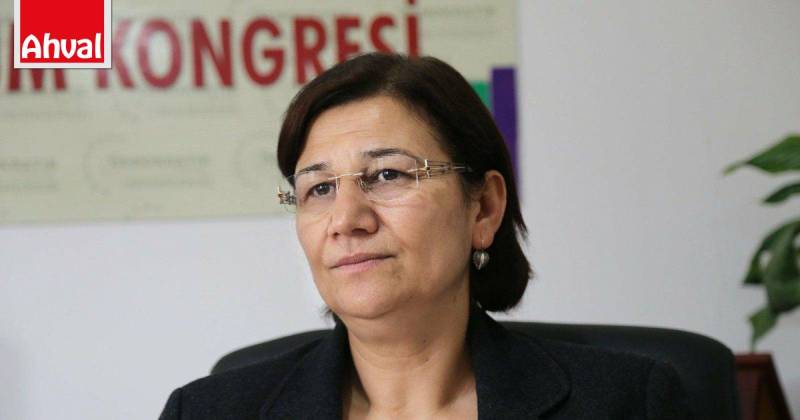After the Turkish offensive against the northwest Syrian Kurdish-held district of Afrin began one year ago, I was detained because of five tweets I made protesting the operation. Police placed me in a cell in the Counter-Terrorism Department in Diyarbakır. One day later, they brought into my cell Leyla Güven, the co-chair of the Democratic Society Congress (DTK), a platform of Kurdish associations and movements. She had also been detained because of speaking out against the war in Afrin.
We stayed in that tiny cell together. Sometimes we exercised, sometimes we sang songs and sometimes told funny stories. Time did not pass quickly in that dark, cold, tiny cell. While awaiting my formal arrest, she helped prepare me for the hard conditions in jail and often said she wanted my release more than her own because of my two small kids.
Two days later I was released and hoped she would also be freed in a few days. But she was not.
After two weeks in the detention centre, she was formally put under arrest. Nearly a year has passed and she is still in jail. Like many others, Güven was arrested on one charge and afterwards many new charges were added.
While behind bars she was elected a member of parliament for Turkey’s pro-Kurdish opposition Peoples’ Democratic Party (HDP) in the June 24 general elections. But this did not change her situation. Her lawyer Reyhan Yalçındağ Baydemir has applied for her release many times, but prosecutors appealed the warrant release warrant issued after her election as a member of parliament and succeeded in having it overturned.
On Nov. 7, in solidarity, I attended her trial. It was the third hearing of her case at the Diyarbakır court. At her trial, she said she was beginning an indefinite hunger strike to protest the isolation of Abdullah Öcalan, the jailed the founder and leader of the Kurdistan Workers’ Party (PKK). No one has heard from Öcalan since Sept. 11, 2016. Before that, he was visited regularly by Turkish officials, Kurdish politicians and by his family. Like many Kurdish people, Güven believes that lifting the isolation of Öcalan would be a big step towards peace in the conflict between the state and the PKK that has lasted more than 30 years.
From the shock of her lawyer, daughter and friends in court, I understood she had not told anyone of her decision before she announced it.
In prisons all over Turkey, more than 200 people began hunger strikes to show solidarity with Güven. Kurdish people outside Turkey have also launched hunger strikes to show solidarity with Güven and her demands.
On Jan. 4, Güven, after being on hunger strike in prison for 58 days, lost her mother. She had lost her father while she was in prison. Due to her deteriorating health because of the hunger strike, she was not able to bid farewell to her mother.
This week it was announced that Öcalan’s brother Mehmet Öcalan had visited him in prison on the island of İmralı. An HDP statement said Öcalan’s medical condition was good. HDP Co-Chair Pervin Buldan said: “Mehmet Öcalan having a meeting does not mean that the isolation is over. This meeting is important but it should not be limited to this.”
But after Öcalan’s brother visit, Güven and the others on hunger strike said they would their action until Öcalan’s isolation was lifted.
Now Güven has been on hunger strike for more than 70 days. Her lawyers said Güven had been unable to see them as she was in a critical condition. Güven’s daughter, Sabiha Temizkan, told the media that her mother’s health was deteriorating daily, but she would not end her hunger strike unless her demands were met.
Güven, a Kurdish member of parliament lies dying in a Diyarbakir prison. She demands the lifting of the isolation imposed on Öcalan, a right that is protected by the Turkish constitution and international law. Not only the Turkish government and parliament, no one wants to hear her. In Turkey, her voice echoes in the silence dominated by fear.
Güven, or as I call her, sister Leyla, lies dying to give peace a chance. If she loses her life in prison, we will not only lose Güven, a determined, diligent Kurdish politician, a mother and a good person who gives hope and confidence to all the people around her, we will also lose a big chance for peace.
